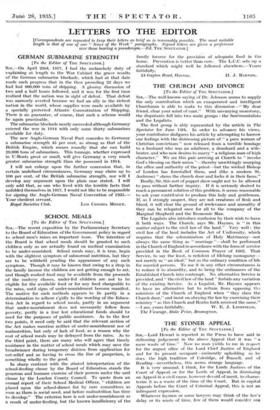LETTERS TO THE EDITOR
[Correspondents are requested to keep their letters as brief as is reasonably possible. The most suitable length is that of one of our " News of the Week" paragraphs. Signed letters are given a preference over those bearing a pseudonym.—Ed. THE SPECTATOR.]
GERMAN SUBMARINE STRENGTH
[To the Editor of THE SPECTATOR.]
`SIR,--On April 23rd, 1917, I had the melancholy duty of explaining at length to the War Cabinet the grave results 'of the German submarine blockade, which had at that date made such progress that in the then preceding 22 days we had lost 600,000 tons of shipping. A gloomy discussion of two and a half hours followed, and it was for the first time realized that the nation was in sight of defeat. That defeat was narrowly averted because we had an ally in the richest nation in the world, whose supplies were made available by a specially protected Atlantic Concentration of Shipping. There is no guarantee, of course, that such a scheme would be again practicable.
The submarine blockade nearly succeeded although Germany entered the war in 1914 with only some thirty submarines available for duty.
The new Anglo-German Naval Pact concedes to Germany a submarine strength 45 per cent. as strong as that of the British Empire, which means roundly that she can build 20,000 tons of submarines. This tonnage, whether expressed in U-Boats great or small, will• give Germany a very much greater submarine strength than she possessed in 1914. '
I will not enlarge upon the further concession that, in certain undefined circumstances, Germany may claim up to 100 per cent. of the British submarine strength, nor will I -develop any argument upon the plain case stated. I will only add that, as one who lived with the terrible facts that unfolded themselves in 1917, I would not like to be responsible for signing the Anglo-German Naval Convention of 1935.— Your obedient servant,






































 Previous page
Previous page